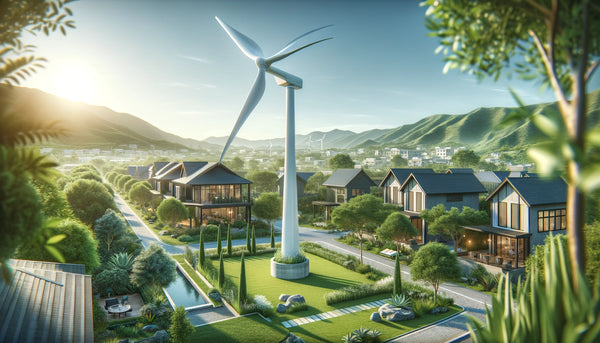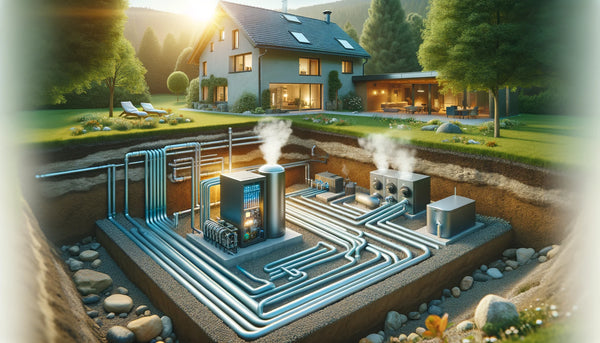In the ever-evolving landscape of energy consumption, the focus on sustainability and efficiency has become paramount. With concerns about climate change and dwindling natural resources, the future of home energy lies in innovative technologies and emerging trends aimed at maximizing efficiency while minimizing environmental impact. From smart devices to renewable energy sources, here's a comprehensive look at what lies ahead in the realm of residential energy consumption.
Table Of Content
- 1. Smart Home Integration
- 2. Energy Storage Solutions
- 3. Solar Power Advancements
- 4. Energy-Efficient Building Materials
- 5. Electrification and Heat Pumps
- 6. Demand Response and Grid Integration
- 7. Energy Monitoring and Analytics
- Conclusion
- FAQs

1. Smart Home Integration
As technology continues to advance, the integration of smart devices into homes has become increasingly prevalent. Smart thermostats, lighting systems, and appliances allow homeowners to monitor and control their energy usage remotely, optimizing consumption patterns and reducing waste. These devices utilize sensors and connectivity to adapt to users' preferences, ultimately leading to significant energy savings over time.
2. Energy Storage Solutions
One of the key challenges in renewable energy adoption has been intermittency. Energy storage solutions, such as batteries and advanced capacitors, play a crucial role in overcoming this obstacle by storing excess energy generated from renewable sources for later use. Home battery systems enable homeowners to store energy from solar panels or wind turbines and utilize it during periods of high demand or when renewable generation is low, increasing self-sufficiency and reducing reliance on the grid.
3. Solar Power Advancements
Solar energy continues to be a promising avenue for residential power generation. Technological advancements, such as improvements in solar panel efficiency and the development of integrated solar roofing materials, make it easier and more cost-effective for homeowners to harness the power of the sun. Additionally, community solar initiatives and shared solar programs enable individuals who may not have suitable rooftops for solar installation to access renewable energy benefits.
4. Energy-Efficient Building Materials
The construction industry is increasingly focusing on energy-efficient building materials and techniques to reduce energy consumption in homes. From high-performance insulation to passive solar design principles, these innovations help minimize heat loss, regulate indoor temperatures, and decrease reliance on heating and cooling systems. Furthermore, the use of sustainable materials, such as recycled steel and bamboo, contributes to both energy efficiency and environmental conservation.

5. Electrification and Heat Pumps
Electrification, particularly in the heating sector, is gaining traction as a means of reducing carbon emissions and increasing energy efficiency. Heat pumps, which transfer heat from one location to another using electricity, offer a highly efficient alternative to traditional heating systems fueled by fossil fuels. Air source heat pumps and ground source heat pumps can provide both heating and cooling capabilities, making them versatile solutions for residential spaces.
6. Demand Response and Grid Integration
Demand response programs and grid integration technologies play a crucial role in balancing energy supply and demand in residential settings. By incentivizing homeowners to adjust their energy usage during peak demand periods, utilities can alleviate strain on the grid and reduce the need for additional infrastructure investments. Smart meters and advanced energy management systems enable real-time monitoring and control of energy consumption, facilitating participation in demand response initiatives.
7. Energy Monitoring and Analytics
Data-driven insights are essential for optimizing energy efficiency in homes. Energy monitoring systems provide homeowners with detailed information about their energy usage patterns, allowing them to identify areas for improvement and implement targeted strategies to reduce waste. Advanced analytics and machine learning algorithms can further enhance the effectiveness of these systems by predicting future energy demands and recommending personalized efficiency measures.

Conclusion
The future of home energy is characterized by innovation, sustainability, and efficiency. From smart home integration to renewable energy adoption and energy-efficient building practices, homeowners have access to a wide range of technologies and trends aimed at reducing energy consumption and minimizing environmental impact. By embracing these advancements and implementing them in residential settings, individuals can contribute to a more sustainable energy future while enjoying the benefits of lower utility bills and increased comfort.
FAQs
What are some innovative technologies shaping the future of home energy?
Innovative technologies such as smart home integration, energy storage solutions, and solar power advancements are shaping the future of home energy. These technologies optimize energy usage, increase efficiency, and minimize environmental impact.
How can homeowners benefit from energy-efficient building materials?
Energy-efficient building materials, including high-performance insulation and passive solar design principles, help reduce energy consumption, regulate indoor temperatures, and lower utility bills for homeowners. Additionally, sustainable materials contribute to environmental conservation.
What role do heat pumps play in residential energy efficiency?
Heat pumps, such as air source and ground source heat pumps, offer highly efficient heating and cooling solutions for residential spaces. By using electricity to transfer heat, heat pumps reduce reliance on fossil fuels and decrease carbon emissions.
How do demand response programs contribute to energy efficiency in homes?
Demand response programs incentivize homeowners to adjust their energy usage during peak demand periods, reducing strain on the grid and lowering utility costs. Smart meters and energy management systems enable real-time monitoring and control for optimized efficiency.
Why is energy monitoring and analytics important for homeowners?
Energy monitoring systems provide detailed insights into energy usage patterns, empowering homeowners to identify opportunities for efficiency improvements and reduce waste. Advanced analytics and machine learning algorithms enhance predictive capabilities for personalized energy-saving strategies.
You May Also Like
- The Role of Energy Monitoring Devices in Home Energy Savings
- The Importance of Home Energy Audits: Identifying Energy Saving Opportunities
- The Importance of Energy Efficiency in Home Appliances
- The Importance of Landscaping for Home Energy Efficiency
- Energy-Efficient Home Design: Tips and Tricks

